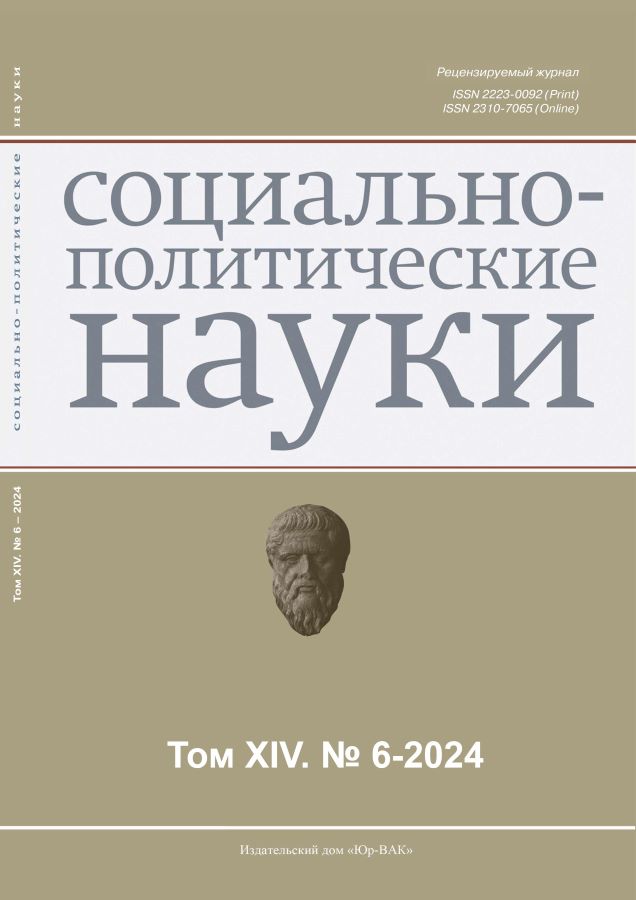Gamification of politics: video games as a tool for shaping discourse and counter-discourse in conflict
- 作者: Kaminsky S.I.1, Fedotov D.A.1, Krivosheev A.А.1
-
隶属关系:
- Saint Petersburg State Electrotechnical University “LETI”
- 期: 卷 14, 编号 6 (2024)
- 页面: 164-173
- 栏目: Conflictology
- URL: https://journals.eco-vector.com/2223-0092/article/view/654087
- DOI: https://doi.org/10.33693/2223-0092-2024-14-6-164-173
- EDN: https://elibrary.ru/EREGIA
- ID: 654087
如何引用文章
详细
The purpose of the study is to examine the pool of foreign virtual reality gaming products dedicated to representing events in Ukraine from 2014 to 2024 in order to identify political images and discursive practices embedded in virtual reality gaming products. In the course of the work, it was established that video games have become an important tool for shaping political discourse and constructing political images, while revealing a significant transformation in the representation of Ukraine: from not being represented as a subject in the 2000s to positioning as an independent state after 2014. Against the background of the fact that the global video game market is about 185 billion dollars with an audience of 2.5 billion people, and 66% of Russians play video games, it is especially important to note that most games are created not by Ukrainian, but by foreign developers, while the image of Russia has evolved from neutral to negative, and after 2022, most games allow you to participate only on the side of Ukraine or its Western allies. Based on the conducted research, recommendations for the development of the domestic gaming industry are proposed, including tax incentives, the creation of their own game distribution platforms, the development of game consoles and support for mobile games, which is necessary for the formation of an effective counter-discourse in the modern information space.
全文:
作者简介
Stanislav Kaminsky
Saint Petersburg State Electrotechnical University “LETI”
编辑信件的主要联系方式.
Email: Stanislavkam13@gmail.com
SPIN 代码: 5482-6834
postgraduate student, Faculty of Humanities
俄罗斯联邦, Saint PetersburgDaniil Fedotov
Saint Petersburg State Electrotechnical University “LETI”
Email: phedotovdaniil@mail.ru
ORCID iD: 0000-0001-8338-6751
SPIN 代码: 7348-9319
Scopus 作者 ID: 581261 01300
Researcher ID: LFV-1566-2024
postgraduate student, Faculty of Political Science
俄罗斯联邦, Saint PetersburgAlexander Krivosheev
Saint Petersburg State Electrotechnical University “LETI”
Email: A.krivosheev@gmail.com
SPIN 代码: 7740-3735
postgraduate student, Faculty of Political Science
俄罗斯联邦, Saint Petersburg参考
- Belov S.I. Computer games as a tool for implementing memory policy (on the example of displaying the events of the Great Patriotic War in video games). Bulletin of the RUDN. Political Science. 2018. Vol. 20. No. 1. Pp. 96–104. (In Rus.)
- Bazaev K.A. The possibilities of cinema in the implementation of information warfare. Proceedings of the Saratov University. A New Series. The Sociology Series. Political Science. 2012. No. 12. Issue 2. Pp. 88–92. (In Rus.)
- Struzhkova E.A. The film industry as the protection of your life or a tool for monitoring national security. Peace in the international arena the conference “China and Russia: State Development Strategies” (St. Petersburg, May 28, 2018). St. Petersburg, 2018.
- Belov S.I. State policy of memory in Ukraine after Euromaidan. International Life. 2022. No. 3. Pp. 28–35. (In Rus.)
- Belyaev D.A., Kutomanov S.A., Reznik S.V. Strategies of application in video games: Practices and actual topics. Nomotetics: Philosophy. Sociology. Right. 2021. Vol. 46. No. 3. Pp. 443–450. (In Rus.). doi: 10.52575/2712-746X-2021-46-3-443-450.
- Grishin E., Iglin D.A. Computer games as an element of mass political culture and communication. Politbook. 2015. No. 1. Pp. 127–135. (In Rus.)
- Dijk T.A. wang. Language. Cognition. Communication. Transl. from English. Moscow, 1989.
- Maltseva D.A., Sedotov D.A., Kaminsky S.I. Video games as a tool for managing the political education of the state in Russia. Songs: Case “Tropico 6”. Encyclopedia. 2023. Vol. 8. No. 14. Pp. 7–22. (In Rus.)
- Maltseva D.A., Fedotov D.A. Transformation of communications among Russian youth of generation Z and under the influence of intensive introduction of gaming technologies. In: Political science in a changing world: New practices and theoretical search. Materials of the All-Russian RAPN Conference with international participation. Moscow, 2023. Pp. 347–348.
- Matytsina M.S. Critical discourse analysis: theoretical and methodological approaches. Bulletin of the Volgograd State University. Series 2: Linguistics. 2019. Vol. 18. No. 3. Pp. 206–216. (In Rus.)
- Robles-Carrilo M. To make sure of this on your own. Journal of Digital Technologies and Law. 2023. Vol. 1. No. 3. Pp. 673–690. (In Rus.)
- Sheigal E.I., Bakumova E.V. Ideologeme as a means of identifying a politician. In: Language and thinking: Psychological and linguistic aspects. Materials of the All-Russian Scientific Conference (Penza, May 15–19, 2001). Penza, 2001. Pp. 193–230.
- Belyaev D.A., Kutomanov S.A., Reznik S.V. Propaganda strategies in video games: practices and current topics. Nomothetika: Philosophy. Sociology. Right. 2021. Vol. 46. No. 3. Pp. 443–450. doi: 10.52575/2712-746X-2021-46-3-443-450.
- Lawler J., Smith S. Reprogramming the history of video games: A historian’s approach to video games and their history. International Public History. 2021. No. 1. Рp. 47–54.
- Miller A. Russia and Europe in memory wars. In Russia and Europe in memory wars. Oslo: Norwegian Institute of International Affairs (NUPI), 2020. 20 p.
- Valeriano B., Habel Ph. Who are the enemies? The visual framing of enemies in digital games. International Studies Review. 2016. No. 18 (3). Pp. 462–486.
- Wolf M. The video game explosion: A history from Pong to Playstation and beyond. Westport, Connecticut; London: Greenwood Press, 2008. P. 23.
补充文件








